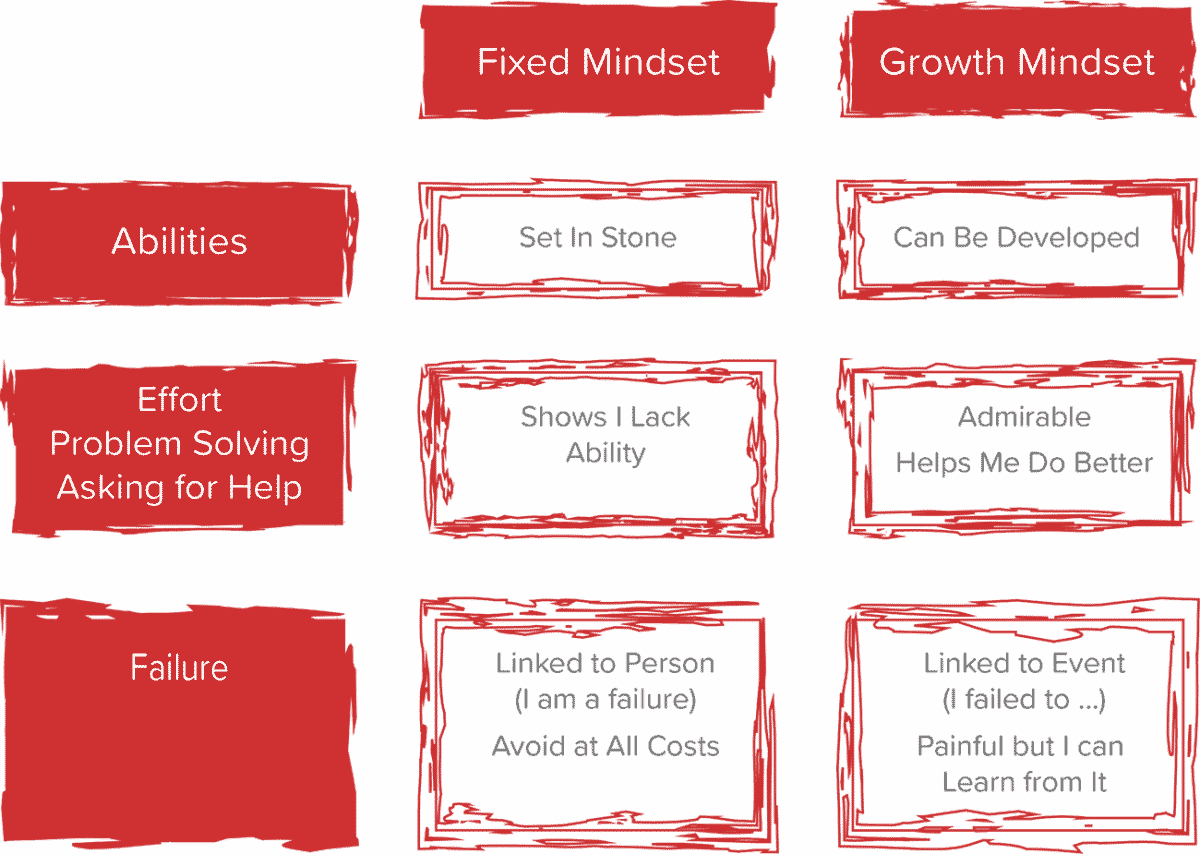Since the launch of Carol Dweck’s book Mindset, teachers have been fascinated by the growth mindset vs the fixed mindset. But does it really matter?

I’ll get to that question soon, but first, let’s look at what mindsets are all about.
Mindsets
Mindsets are beliefs. In this case, they refer to beliefs about your own and other people’s abilities.
The Fixed Mindset
 People with a fixed mindset believe that their (and others’) abilities are fixed. Put another way, some people are smart, and other people are not. The same applies to other abilities such as being sporty, musical, creative or artistic.
People with a fixed mindset believe that their (and others’) abilities are fixed. Put another way, some people are smart, and other people are not. The same applies to other abilities such as being sporty, musical, creative or artistic.
According to Dweck, people with a fixed mindset are motivated to avoid failure. They believe that people’s abilities are set in stone, so they want to show the world that they possess high levels of ability. As a result, they avoid taking risks that may lead to failure.
The Growth Mindset
 People with a growth mindset believe that their abilities can be developed. Put another way, they believe they can learn to be smarter, more creative etc.
People with a growth mindset believe that their abilities can be developed. Put another way, they believe they can learn to be smarter, more creative etc.
According to Dweck, they are motivated to put effort into learning and improving themselves. As a result, they are more likely to see failure as something they can learn from.
Some Critical Misunderstandings About the Growth Mindset
Praise is a potential way to nurture a growth mindset. So too are encouraging effort and other actions that help learning. But, as Carol Dweck notes in her updated book, they can be misinterpreted.
- Praise is a potentially powerful way to shape students behaviour. Yet, praising mediocre effort only leads to students producing more of that mediocre effort. That is not what the growth mindset is about. You should only praise genuine effort.
- Effort. We want our students to work hard and put effort into the things they do at school. But effort alone is not enough. When students are not succeeding, doing more of the same and trying harder are not always the best options. Sometimes, other actions are needed. For example, students could try new approaches or ask for help when needed.
- Actions. So far, we have learned that you should only praise real effort. And, we know that effort is but one action that we should encourage. We also need to encourage students to change their approach and ask for help when needed. But encouraging such actions is only half of the story. You want your students to see how their actions led to their results. You must link what they did to what they achieved.
A Comparison of Thinking with the Different Mindsets
The following table shows some key ways that fixed mindset and growth mindset differ.

When Students with Growth Mindset vs Fixed Mindsets Find Things Hard
Here is a visual example, showing the different way students with a growth mindset and fixed mindset respond to challenges, setbacks and failures.

Does Having a Growth Mindset Make a Difference to Student Success?
The short answer is yes. Research shows that students with a growth mindset tend to outperform students with a fixed mindset.
But the difference is not large.
A 2018 meta-analytic review of research showed that it had a moderate effect on students’ academic success. By comparison, research shows that self-efficacy had a large impact on students’ learning.

Note – this research is about the impact that having a growth mindset vs fixed mindset. It is not on the success of teachers’ efforts to nurture a growth mindset. More on that now.
Can Teachers Change Students’ Mindsets?
Ironically, if you have a fixed mindset, you are likely to say no. And, if you have a growth mindset you are likely to say yes. But what does the research say?
The National Study of Learning Mindsets
To help answer this question, David Yeager and his team of other researchers (including Carol Dweck) have conducted one of the largest studies in this area. They call it the National Study of Learning Mindsets.
The study involved:
The study found that a short, low-cost, online and easy to administer intervention could have a moderate impact on students’ mindsets.

What Impact Do Growth Mindset Programs Have on Students’ Learning?
The National Study for Learning Mindsets found that a short, low-cost, online and easy to administer intervention could have a small impact on struggling students’ academic results.

Key features of online training included:
This result is similar to the result of a 2018 meta-analysis conducted by Brooke Macnamara and her colleagues. It too showed that mindset programs only had a small impact on students’ learning. Although, it showed a slightly larger impact for struggling students.

Macnamara’s study also found that students from low-SES homes benefited more from mindset programs (Effect Size = 0.34).
Furthermore, Macnamara’s study found that growth mindset programs were more effective when they involved:
Advice for Teachers: Growth Mindset vs Fixed Mindset
Having a growth mindset rather than a fixed mindset has a moderate impact on how well students do at school. Teaching students about the growth mindset vs fixed mindset has a small, but positive impact on students’ success at school.
This is especially the case for students from low-SES homes and for struggling students.
And, the impact seems to be long-lasting.
Given the small amount of time and effort it takes to teach students about the growth mindset, it may be something worth doing.
If you work in the United States or Canada, and you teach Year 9 – you can register and have your students complete the 2 online sessions used in the National Study for Learning Mindsets. It’s free, but I suggest you talk to your principal first.
Growth Mindset FAQs
Here are some questions people ask about mindsets and the answers that go with them.
[sc_fs_multi_faq headline-0=”h3″ question-0=”What is a growth mindset?” answer-0=”People with a growth mindset believe that they can develop the abilities you were born with. This includes academic abilities, musical talent and sporting prowess. People with a growth mindset believe that your potential is truly unknown.” image-0=”” headline-1=”h3″ question-1=”What is an example of a growth mindset?” answer-1=”A growth mindset is simply a belief that you can develop your abilities. The most common example is a belief that you can develop your intellectual abilities. People with a growth mindset believe that the mind is like a muscle that can be strengthened with use. You can apply the same principle to other abilities, such as physical prowess, musical aptitude and emotional intelligence.” image-1=”” headline-2=”h3″ question-2=”What is a fixed mindset?” answer-2=”People with a fixed mindset believe that they are born with certain abilities or lack thereof. They do not believe that you can develop your abilities.” image-2=”” headline-3=”h3″ question-3=”What is a fixed mindset and a growth mindset?” answer-3=”People with a fixed mindset believe that you are born with particular abilities (e.g. intellectual, social, creative) and that you can’t do much to change them. People with a growth mindset acknowledge that nature bestows some natural abilities. But they also believe that they can develop their abilities and that people’s potential is always unknown. ” image-3=”” headline-4=”h3″ question-4=”Why is a growth mindset important?” answer-4=”Research shows that having a growth mindset has a positive impact on students’ success at school. This impact is even larger for students who struggle or who have hard home lives. ” image-4=”” headline-5=”h3″ question-5=”What is a growth mindset and why is it important?” answer-5=”A growth mindset is a particular way of looking at intellectual and other abilities. If you have a growth mindset, you believe that you can develop these abilities. You may acknowledge that nature deals you a certain hand, but you believe that hand is not set in stone. Students with a growth mindset are more likely to succeed at school. And, the theory proposes that they are better equipped to manage the challenges and setbacks they experience along the way. ” image-5=”” count=”6″ html=”true” css_class=””]

Wouldn’t focusing improvement in knowledge and skills be the best way to promote a “growth mindset”? That way, they would see the evidence for it with their own eyes.
Hi Janita
Thanks for taking the time to comment. Your comment got me thinking (which I always like)
I think knowledge and skills are the main game in education, and that achieving success in those areas can build confidence, efficacy, etc.
I also think mindsets add to that, by helping students attribute success/failure to effort and action rather than just innate ability. Self-efficacy works in a similar way but is more specific.
Success breeds success (in knowledge & skills) if it is attributed to the right things. Temporary failure can also breed success if it is attributed in a helpful way.